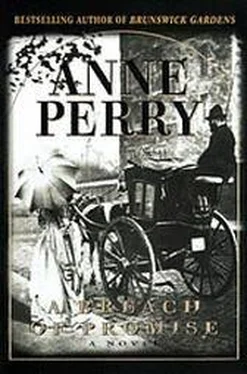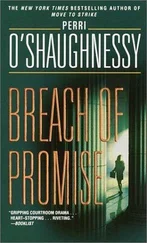Rathbone remained another half hour, but he could get nothing more from Melville, At quarter to ten he left and went home through rising wind and squalls of rain, still surprisingly cold.
He poured himself a draft of single-malt whiskey and drank it neat, then went to bed. He slept very badly, troubled by dreams.
The trial resumed the next morning with Sacheverall providing witnesses to Zillah's blameless character, as Rathbone had known he would. It was hardly necessary-her own appearance had been sufficient-but then he could not be certain that Rathbone had no witness of his own in store, someone who could cast doubt on the innocence and charm they had seen.
The first was a Lady Lucinda Stoke-Harbury, a girl of Zillah's own age who was newly betrothed to the second son of an earl, and impeccably respectable. She stood with her head high, her eyes straight ahead, and spoke clearly. Sacheverall could not have found anyone better, and the very slight swagger with which he walked to and fro on the open space of the floor showed his confidence. He smiled like an actor playing to the gallery, and seemed just as sure that the rest of the cast would respond as if according to a script.
"Lady Lucinda, please tell us how long you have been acquainted with Miss Lambert, if you would be so kind."
"Oh, at least five years," she replied cheerfully. "We have been great friends."
Sacheverall was delighted; it was exactly the reply he wanted. He hesitated long enough to make sure the jury had fully digested the statement, then continued.
"Have you many friends in common?"
"Naturally. We attend all the same parties, dinners, balls and so on. And we have often been to art galleries and lectures together."
"So you know her well?"
"Yes, I do."
It was all very predictable, and there was nothing Rathbone could do to affect it. To cast doubt on Lady Lucinda's judgment, or her honesty in expressing it, would only play directly into Sacheverall's hands. It could both turn the jury against him, and indirectly Melville, and show them his own desperation. If he had any evidence of his own he should produce it, not insult Lady Lucinda.
Sacheverall grew more and more enthusiastic, seeking praise and affirmation for Zillah with many new avenues of questioning.
Rathbone looked around the gallery. He saw the range of expressions on the faces as they craned forward, listening to every word. For a woman in black bombazine with a ribboned hat it was an avid interest showing in her eyes, her lips parted. For a man with gray side-whiskers it was more relaxed, even a trifle cynical, a half smile. A well-dressed young woman with straight brown hair under her bonnet looked at Melville with undisguised contempt. Her neighbor seemed more curious as to why a young man with such golden opportunities before him should risk losing it all for such an absurd reason. Rathbone could almost read the speculation in their eyes as to what was unsaid behind the polite words from the witness stand. What was the real reason behind this charade?
More than once he caught someone looking at him, speculation easily read as to what he could do, what he knew and would spring on them, when he was ready.
He wished there were something!
He saw several studying the jury, and perhaps trying to guess their thoughts, although at this point there seemed only one possible verdict.
Melville sat through it all sunk in unhappiness but without moving, except occasionally to put his fingers up to his mouth, and then away again, but he did not speak. He did not offer any contradictions or suggestions of help.
Rathbone declined the offer to question Lady Lucinda. There was nothing whatever to ask.
The next witness was another young woman of impeccable reputation, and she reaffirmed everything that had already been said.
The judge looked enquiringly at Rathbone.
"No, thank you, my lord," he said, rising briefly to his feet and then sitting down again.
Sacheverall was delighted. His contempt, not only for Melville but for Rathbone also, was vivid in his face and the entire attitude of his body.
He called the Honorable Timothy Tremaine and asked him for his opinion of the most admirable Miss Zillah Lambert. As Tremaine spoke, his own admiration for her grew more and more apparent. He smiled, he met her eyes, and his eager expression softened. He spoke of her with a warmth which was more than mere sympathy. An idea began to form in Rathbone's mind, not clearly, and only a thread, but he had nothing else.
"Your witness, Sir Oliver," Sacheverall said finally, with an ironic half bow towards Rathbone.
Rathbone rose to his feet. "Thank you, Mr. Sacheverall." He was acutely aware of all eyes upon him. There was a hush as if awaiting a startling event. He would disappoint them, and it rankled with him more sharply than he had expected. He felt the defeat already.
"Mr. Tremaine," he began quietly, "you spoke of Miss Lambert as if you are quite well acquainted with her. May I assume that is so?"
"Yes sir, you may," Tremaine answered politely. He too must have been waiting for some retaliation at last.
Rathbone smiled. "And you expressed some regard for her yourself-indeed, some admiration?" It was not really a question.
"Yes sir." Tremaine was more guarded now.
Rathbone's smile widened. He knew what the gallery was waiting for, what Tremaine himself quite suddenly feared. It was there in his face. He drew in his breath as if to add something, then changed his mind.
"Yes?" Rathbone enquired helpfully.
"Nothing…"
"There is no need to apologize for your feelings," Rathbone assured him. "It is only natural. She is most attractive. Indeed, Mr. Sacheverall himself has been unable to conceal a very considerable"-he hesitated delicately-"personal regard towards her…"
He heard Sacheverall's indrawn breath behind him and ignored it.
"I…" Tremaine realized the trap and sidestepped it rather obviously. "Yes sir. I think we all feel a certain… friendship towards her which-" He stopped, uncertain how to complete the thought.
"Is your regard as… warm as Mr. Sacheverall's?" Rathbone asked blandly.
"Well…" Tremaine looked at him squarely. "I could say I regard her more as a friend…"
Sacheverall stood up, his face only very slightly pink. "My lord, the depth of my regard for Miss Lambert is irrelevant. It is Mr. Melville's behavior towards her which is at issue here. If Sir Oliver is trying to suggest that I have in any way overstepped the bounds of the strictest propriety, or that Miss Lambert has regarded me as other than her legal counsel, then I would warn him that he is not above the laws of slander either, and I will protect Miss Lambert's good name with every skill at my disposal… and every weapon also!"
Rathbone laughed very lightly and swiveled to look at Sacheverall.
"My dear Sacheverall, you have spent the morning persuading me of Miss Lambert's virtue, charm and total desirability. Is it really now slanderous for me to suggest that you are not immune to charm yourself? Surely it would be more so to suggest that you are? Then you might think I accused you of being less than a natural man. Or at the very least of speaking insincerely, saying something which you yourself did not believe."
"You are-" Sacheverall began.
But Rathbone overrode him. "Your sincerity seemed to ring through your words, your choice of adjectives to describe her, the very ardor of your tone and the grace of your gestures. You made your argument superbly."
"What is your point?" Sacheverall snapped, his cheeks flushed. "There is nothing improper for you to find!" He gestured towards Melville, who was sitting staring at him. "That is where the fault lies. You have paved the way for that yourself! Indeed, it would be an unusual man-perhaps, to borrow your own phrase, something less than a natural man-who would not admire Miss Lambert!" His face twisted into an expression suddenly far uglier than perhaps he knew. "Have you considered, Sir Oliver, that you do not know your own client as well as you imagine? You are the last man I would have supposed naive, but I could be mistaken." His meaning was masked, but it was clear enough. There was a gasp around the room. One or two of the jurors looked taken aback. The remark was indelicate at best, at worst slanderous.
Читать дальше











